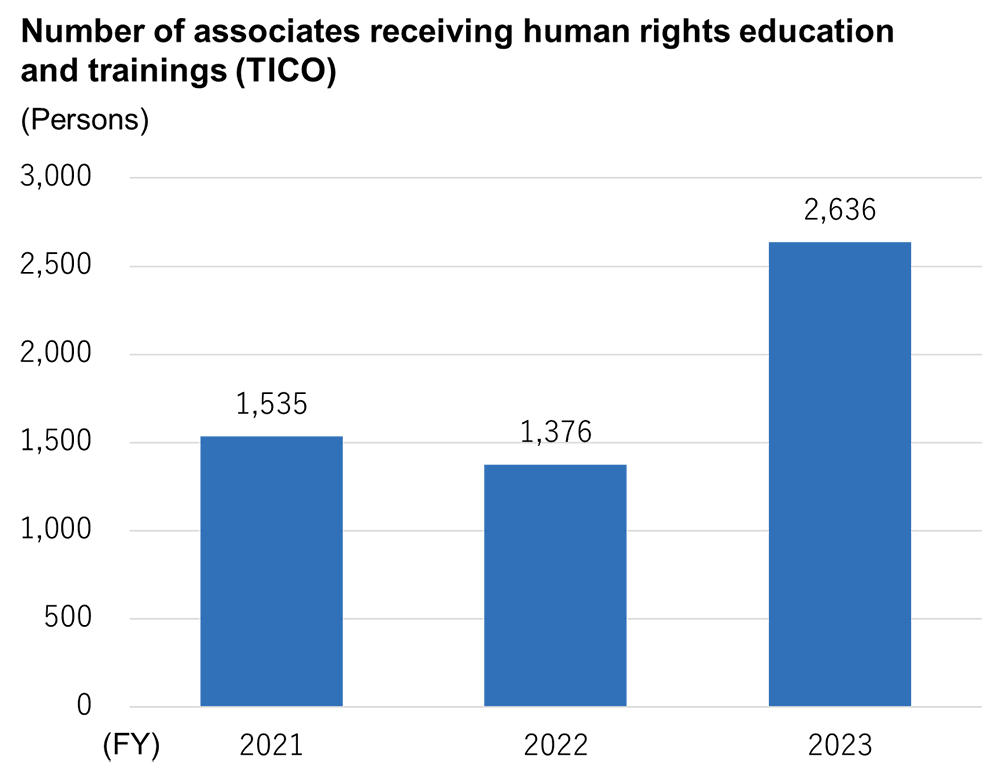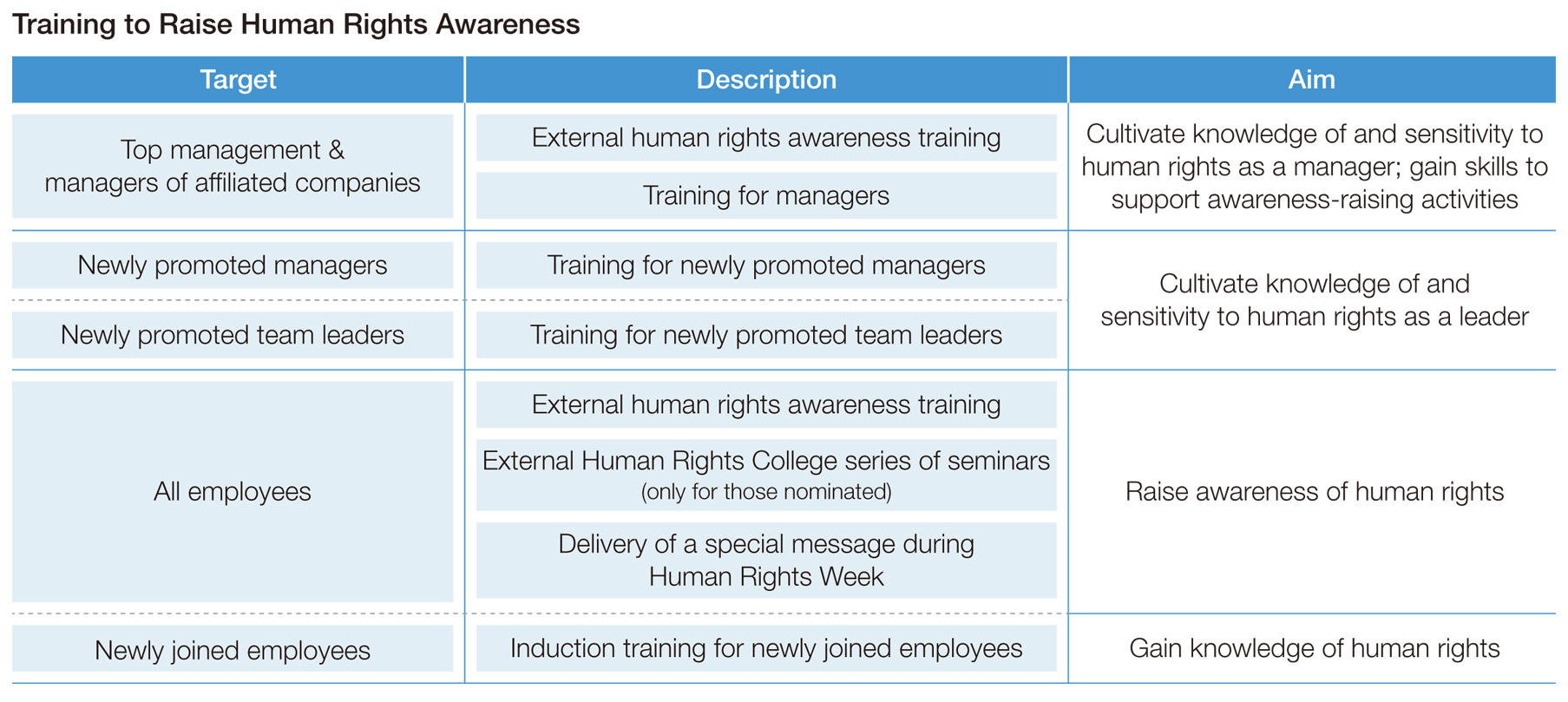Respect for Human Rights
Basic Concept
Since its founding, Toyota Industries has endeavored to make the earth a better place to live and enrich society based on the Toyoda Precepts (corporate creed). We recognize that in order for us to continuously contribute to the harmonious and sustainable development of the earth and society, it is essential not only to ensure legal compliance but also respect the human rights of all people involved in our corporate activities. Under this recognition, we have been promoting our initiatives to respect human rights in accordance with the United Nations Guiding Principles on Business and Human Rights.
Formulation of the Human Rights Policy
Toyota Industries has formulated the Toyota Industries Group Human Rights Policy (“Human Rights Policy”) under the belief that we should step up our ongoing human rights initiatives.
While giving consideration to the opinions and information provided by external experts and other parties, the Human Rights Policy was formulated after discussions and approval by the CSR Committee led by the president.
It is positioned as the highest-level policy related to human rights within the Toyota Industries Group.
Toyota Industries Group Human Rights Policy
Established in September 2021
We, Toyota Industries Corporation and our subsidiaries, have constantly endeavored to make the earth a better place to live in and enrich society based on the Toyoda Precepts (Corporate Creed) and our Basic Philosophy since its founding.
We recognize that it is essential to respect the human rights of all people and comply with laws and regulations to continuously contribute to the harmonious and sustainable development of society and the earth through all corporate activities.
This policy ensures that we respect internationally recognized human rights based on the United Nations Guiding Principles on Business and Human Rights.
Toyota Industries Group regards this as its highest policy related to human rights.
1.Commitment to respect human rights
We recognize that our corporate activities ranging from research, development, and procurement to the provision of products and services, may directly or indirectly affect human rights.
We respect internationally recognized human rights, including prohibition of forced labour and child labour, right to freely associate or not associate, and elimination of discrimination, expressed in the International Bill of Human Rights and the International Labour Organization’s Declaration on Fundamental Principles and Rights at Work. We also support the United Nations Guiding Principles on Business and Human Rights and strive to put them into practice.
We comply with laws and regulations of each country and region where we conduct business. We seek ways to respect internationally recognized human rights to the extent possible when laws and regulations of each country or region differ from internationally recognized human rights.
2.Scope
This policy applies to all executives and employees of the Toyota Industries Group. We also expect all our business partners, including suppliers, to understand and support this policy.
3.Human rights due diligence
We establish and continuously implement a human rights due-diligence process to identify, prevent, mitigate negative impacts on human rights related to our corporate activities and account for how we address them based on the United Nations Guiding Principles on Business and Human Rights.
4.Correction and remediation
We endeavor to correct and remedy any negative impact on human rights through appropriate means where we identify that we have caused or have been involved in such case. We also establish consultation service for individuals and communities who may have been adversely impacted.
5.Education and awareness-raising activity
We conduct appropriate education and awareness raising activities to our executives and employees and strive to prevent negative impacts on human rights through the dissemination of this policy. We also reflect this policy in related policies and necessary procedures to embed it throughout our corporate activities.
6.Monitoring and information disclosure
We continuously monitor the status of compliance with this policy and make improvements as necessary. We also periodically disclose the status of initiatives related to human rights through our website, integrated report, and other communication tools.
7.Dialogue with stakeholders
We engage in dialogue and consultation with relevant stakeholders to identify negative impacts on human rights and address to them appropriately.
Akira Onishi
President
TOYOTA INDUSTRIES CORPORATION
 Toyota Industries Group Human Rights Policy PDF [217.3KB / 2pages]
Toyota Industries Group Human Rights Policy PDF [217.3KB / 2pages]
Implementation Structure
Toyota Industries recognizes that the Group’s corporate activities, from research and development to procurement and provision of products and services, may directly or indirectly impact human rights. To respond to various human rights issues, we have established the Human Rights Task Team, which is led by the Human Resources Department and consists of the relevant departments, including the Corporate Planning, Purchasing and Legal departments. In accordance with the Human Rights Policy, the team engages in various activities, such as sharing each department’s initiatives and the latest social trends related to human rights and creating action plans.
Human Rights Due Diligence
We conduct human rights due diligence to specify, prevent and mitigate negative impacts on human rights caused by the Toyota Industries Group’s corporate activities.
The Human Rights Task Team has evaluated human rights issues relevant to the corporate activities of the Toyota Industries Group, which were identified based on the handbooks of Japan’s Ministry of Justice and the Japan Federation of Economic Organizations (Keidanren) as well as checking items defined by external rating agencies. Consequently, we have specified two priority human rights issues, namely immigrant labor and raw material procurement, and have been undertaking related activities.
Initiative on Immigrant Labor (Forced Labor of Non-Japanese Workers)
Amid the growing attention to protecting and respecting the human rights of non-Japanese workers, Toyota Industries regards forced labor of non-Japanese trainees working under Japan’s Technical Intern Training Program as one of its priority human rights issues.
External experts have pointed out that there is possibly a risk of forced labor when accepting trainees from overseas through local brokers, as these brokers may charge exorbitant placement fees to trainees, who end up coming to Japan with a huge debt.
Toyota Industries conducted a survey to check trainee enrollment and appropriate operation of the program at its consolidated subsidiaries and major suppliers in Japan and found that, as of December 31, 2022, 216 companies have accepted trainees under the program. The largest number of trainees was from Vietnam, accounting for 40% of all trainees.
At our consolidated subsidiaries, we have further surveyed the fees charged to these Vietnamese trainees. As a result, we have confirmed that no trainees have been charged fees in excess of the upper limit specified in Vietnam’s domestic law. We have also set up a consultation hotline for non-Japanese trainees working under the program by utilizing the Japan Platform for Migrant Workers towards Responsible and Inclusive Society. Our efforts in the future will be geared toward reviewing fee charging, which, if done inappropriately, could lead to forced labor of non-Japanese trainees.
Initiative on Raw Material Procurement (Minerals)
Based on the OECD Due Diligence Guidance for Responsible Supply Chains of Minerals from Conflict-Affected and High-Risk Areas, Toyota Industries Corporation has formulated the Policies for Responsible Procurement of Minerals. Under the policies, we have been conducting procurement activities excluding minerals that may involve human rights abuses, such as funding armed groups, child labor, forced labor and working under poor conditions.
We adhere to the purpose of the RMI* which is globally initiating conflict mineral initiatives, and conduct mineral survey and due diligence throughout the supply chain using the industry-standard reporting templates by RMI. If we should find any considerable risk in the supply chain, we will take risk reducing measures such as requesting suppliers corrections. In cooperation with all the suppliers, we will continue engage in responsible mineral procurement as the whole supply chain.
*RMI (Responsible Minerals Initiative): an organization initiating the members of over 300 companies and associations from all over the world for initiatives regarding conflict minerals.
Policies and Approaches to Responsible Mineral Sourcing
Toyota Industries Corporation and its subsidiaries promote the acquisition of materials with full deliberation and care to avoid the procurement or usage of materials which are unlawful or which are obtained through unethical or otherwise unacceptable means.
We recognize that the situation surrounding conflict minerals originating in Covered Countries is a significant social issue in supply chains. We pursue procurement and usage that are free from conflict minerals originating in Covered Countries and relating to illegal conduct including human rights infringement.
We also recognize that human rights abuses such as child labor in the procurement of cobalt, etc., are a serious social problem, and we pursue procurement activities that do not include minerals that are suspected of being involved in such abuses.
To achieve such procurement and usage, we conduct inquiries tracing back through our supply chains and confirm if such minerals are used. In addition, we take appropriate steps to discontinue procurement of materials that can cause social problems such as human rights violations or financing of armed groups, if such usage is detected. Based on mutually beneficial relationships, we ask our suppliers to understand our policies and approaches and to conduct responsible material procurement.
Efforts for Correction and Remediation
Toyota Industries operates a compliance hotline (external helpline) that allows employees of Toyota Industries Corporation and its major consolidated subsidiaries in and outside Japan to seek advice on compliance-related matters, including human rights, with a sense of security and without being exposed to negative consequences.
Education and Awareness-Raising Activities
To remain a company committed to respecting the human rights of all people involved in our corporate activities, the relevant departments of Toyota Industries participate in lectures hosted by the government and human rights organizations and joint study sessions with other Toyota Group companies. We also hold training sessions for consolidated subsidiaries, in which their top management participates. Our education and awareness-raising activities target executives and all employees and aim to cultivate a correct knowledge of human rights and encourage them to put the idea into practice. Along with providing induction training for new employees, grade-based training and other conventional programs, we have been making proactive efforts even during the COVID-19 pandemic, such as designating a particular week as “Human Rights Week” and utilizing e-learning programs.


Dialogue with Stakeholders
Toyota Industries promotes dialogue with various internal and external stakeholders and works with its top management and the relevant departments to reflect such dialogue in its future corporate activities.
Communication Channels
Employees.................................. Labor-management round table meetings, annual labor-management meetings, hotline
Business partners....................... Procurement policy meetings, hotline
Shareholders and investors........ Toyota Industries Reports, Toyota Industries’ official website, ESG dialogue
Local community......................... Inviting residents to Toyota Industries’ events, participating in local events, local community meeting
